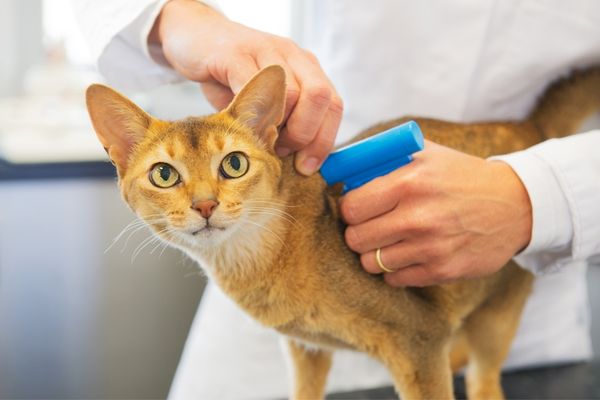There are two days each year when the most U.S. pets get lost: The 4th of July and New Year’s Eve.
The explosive noise and flashes of light from fireworks scare the “pants” off many dogs and cats.
Of course, Seattleites don’t wait until midnight on New Year’s Eve to shoot off fireworks. You’ll hear a smattering of booms throughout the day, with neighborhood fireworks starting in earnest at 9pm (to coincide with the Time Square Ball Drop) and continuing past midnight.
Some pet owners unwisely bring their dogs with them to New Year’s Eve celebrations, where the combination of unfamiliar surroundings, crowds, loud music, alcohol, and fireworks creates a potent cocktail practically guaranteed to send panicked pets running for cover (not to mention getting “the runs,” and you don’t want that, either).
By planning ahead, you can help calm your pets’ nerves and keep them safe on New Year’s Eve.
Protect your Pet with a Collar, ID tag, and Microchip
You don’t want your pet to be one of the 7.6 million pets who are lost each year.
Even if your pet wears a collar and ID tag, those can fall off. A collar, ID tag, and properly-registered microchip will increase the chances of your pet being reunited with you if it runs away.
What is a Microchip?
Microchips are implantable computer chips no bigger than a grain of rice. The microchip is placed under your pet’s skin by your veterinarian with a needle and syringe.
The chip receives a radio signal from a scanner and transmits a unique encoded identification number back to the scanner, to help reunite you with your pet.
Register the Microchip
It is important to register your pet’s microchip, to maintain updated contact information, and to provide multiple emergency contacts in case your pet gets lost while you’re out of town.
Give your pet the best chance of being reunited with you. Call us today at 206.323.4433 to schedule an appointment to have your pet microchipped.
Create a Safe Place for Your Pet
Whether you’re hosting a get-together or spending a quiet evening at home, you’ll want to keep your pet indoors on New Year’s Eve.
- Close pet doors, windows, and curtains.
- Set up a comfortable pet bed in the most sound-proofed space in your home, as far away as possible from noisemakers, poppers, fireworks, loud music, and conversations. A good location might be a closet or the basement.
- If you have a cat, provide access to as many hiding places as possible.
- Dim the lights and turn on soothing white noise such as a fan, air conditioner, radio, or television.
- If you have a white noise machine, try playing the sound of a gentle rainfall. Every Seattle pet is accustomed to that particular sound, and it’s likely to calm them.
- Provide toys and treats to distract your pet.
If you’re hosting a party, consider temporarily disabling your doorbell, particularly if you have a dog who barks like crazy whenever it rings. If a lot of people will be coming and going, your curious pup will want to meet them, but your dog may also freak out and make a break for it out the front door.
Your dog is not the host of your party – you are.
Keep your dog safe, in a room away from the door.
If you’re planning to go out on New Year’s Eve, recruit a family member, friend, or neighbor to pet-sit. Be sure to supply your sitter with your pet’s water bowl, bed, and their favorite food, treats, and toys.
If your pet experiences severe noise anxiety, we can recommend medications that may help decrease anxiety and relax your pet.
Give Your Pet Plenty of Physical Activity
When their normal routine gets disrupted, pets often get frightened and anxious. They’ll likely sense that there’s something different about this day, so make an effort to spend extra time with your pet throughout the day. Buy a new toy for your pet and actively play with them throughout the day.
Earlier in the day (when it’s still relatively quiet), take your pet for a longer-than-usual walk, which will tire them out and help them relax and sleep more soundly. During your walk, be prepared for people to unexpectedly set off fireworks. Make sure your pet’s collar ID tag, GPS tracker, and leash are properly attached.
If you’re home with your pet during the evening, be extra attentive to them. If your stressed pet pees or defecates on the floor, don’t yell at them. Instead, attempt to make your presence a comforting one. Distract your pet by calmly playing together or listening to soothing music.
Keep Your Pet Away From Toxic Substances
Alcohol. Marijuana. Salty snacks. Liqueur-filled chocolates. Balloons. Streamers. Party Poppers.
New Year’s Eve is a veritable feast of items that can cause digestive issues, poisoning, and other health issues.
Alcohol
Copious amounts of alcohol are often within easy reach of curious pets on New Year’s Eve, so it’s not surprising that a lot of opportunistic pets get alcohol poisoning.
Sadly, some people think it’s funny or cute to get a pet tipsy.
Please, PLEASE don’t serve a dog or cat alcohol!
One teaspoon of grain alcohol (hard liquor) is enough to cause severe alcohol toxicity symptoms in cats and dogs. One tablespoon is enough to put a healthy cat or small dog into a coma, and can even be fatal.
Pets who consume even a small amount of alcohol have a similar, yet more severe reaction to alcohol than their human counterparts: vomiting, diarrhea, decreased coordination, central nervous system depression, lethargy, difficulty breathing, tremors, abnormal blood acidity, drops in body temperature and blood pressure, loss of consciousness, cardiac arrest, acute kidney failure, and even death.
(Yes, we know we sound like a TV commercial that ominously intones a long list of potential side-effects of a prescription drug, but we want you to be aware of the dangers of alcohol poisoning!)
Marijuana
The same goes for marijuana. Pets who inhale secondhand marijuana smoke or eat edibles that contain caffeine, chocolate, garlic, grapes, raisins, or Xylitol often require emergency treatment.
According to the Animal Poison Control Center (APCC), “Marijuana can cause your pet to become unsteady, sleepy and sensitive to touch, and can cause a decrease in their heart rate and body temperature. In rare cases, seizures and death may be possible.”
Other Items Toxic to Pets
- Salty snack foods
- Chocolate
- Raisins
- Grapes
- Onions
- Garlic
- Raw and under-cooked meat
- Poultry, beef, and pork bones
- Pie crust
- Decorations (streamers, balloons, ribbons, twinkly lights)
For more information, read these articles on our blog:
- 19 Household Items That Can Poison Your Dog
- Marijuana: Concerns and Possible Benefits in Veterinary Medicine
The last thing you want is to ring in the New Year with an emergency visit to the vet.
Whether you’re entertaining at home or you’re at a party away from home, assume that dangerous items will be within your pets’ reach. Keep a close eye on your furbabies, and do your best to keep them away from toxic substances.








